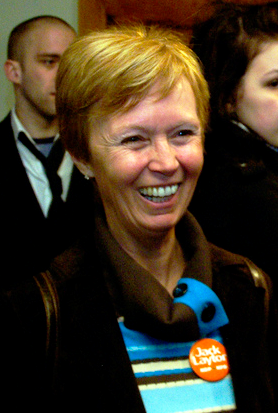The United Food and Commercial Workers International Union (UFCW) is a labor union representing approximately 1.3 million workers in the United States and Canada in industries including retail; meatpacking, food processing and manufacturing; hospitality; agriculture; cannabis; chemical trades; security; textile, and health care. UFCW is affiliated with the Canadian Labour Congress (CLC) and the AFL–CIO; it disaffiliated from the AFL–CIO in 2005 but reaffiliated in 2013. UFCW is also affiliated to UNI Global Union and the IUF.

The Canadian Labour Congress, or CLC is a national trade union centre, the central labour body in Canada to which most Canadian labour unions are affiliated.

The International Alliance of Theatrical Stage Employees, Moving Picture Technicians, Artists and Allied Crafts of the United States, Its Territories and Canada, known as simply the International Alliance of Theatrical Stage Employees, is a North American labor union representing over 168,000 technicians, artisans, and craftspersons in the entertainment industry, including live theatre, motion picture and television production, broadcast and trade shows in the United States, its territories, and Canada. It was awarded the Tony Honors for Excellence in Theatre in 1993.
The Canadian Union of Public Employees is a Canadian trade union serving the public sector – although it has in recent years organized workplaces in the non-profit and para-public sector as well. CUPE–SCFP is the largest union in Canada, representing some 700,000 workers in health care, education, municipalities, libraries, universities, social services, public utilities, transportation, emergency services and airlines. Over 60 per cent of CUPE–SCFP's members are women, and almost a third are part-time workers. CUPE–SCFP is affiliated with the Canadian Labour Congress and is its greatest financial contributor.

The Fédération des travailleurs et travailleuses du Québec is the largest labour federation in Quebec in terms of its membership. It has over 500,000 members, who account for 44% of the unionised workers in Quebec. This ratio is 60% in the private sector, in which most members work. It also has many members in government agencies.
The Northern Territories Federation of Labour (NTFL), affiliated to the Canadian Labour Congress, represents workers in the Northwest Territories and Nunavut. The federation was founded in 1980 and represents 9,000 workers in 17 affiliated trade unions.
The Leadership Conference on Civil and Human Rights, formerly called the Leadership Conference on Civil Rights, is an umbrella group of American civil rights interest groups.
John Gordon was the president of Public Service Alliance of Canada, a public service union in Canada. John Gordon first joined PSAC in 1974 as a tradesperson with Public Works Canada.
The Union of National Defence Employees is a component of the Public Service Alliance of Canada.

SEIU Healthcare is a Canadian trade union representing more than 60,000 workers in Ontario, Canada. Through collective bargaining, the union represents workers in hospitals, home care, nursing and retirement homes, and community services. The union has been active in Ontario for over 70 years.
The Alberta Union of Provincial Employees (AUPE) is a Canadian trade union operating solely in the province of Alberta. With approximately 95,000 members as of March 2019, it is Alberta's largest union. AUPE is primarily a public sector union, with members employed in government, health care, education, boards and agencies, municipalities, and occasionally private companies.

The Union of Postal Communications Employees is a Canadian public employee labour union.

Nycole Turmel is a Canadian politician who served as the member of Parliament (MP) for Hull—Aylmer from 2011 to 2015. A member of the New Democratic Party (NDP), Turmel served as the party's interim leader from 2011 to 2012.
The Union of Taxation Employees (UTE) represents more than 30,000 employees of Canada Revenue Agency. It is a component of Public Service Alliance of Canada. It is organized into 60 Locals, from St. John's to Victoria.

The Agriculture Union is an affiliate of the Public Service Alliance of Canada (PSAC). It has more than 8,000 members who work for Canadian federal government departments and agencies such as the:

Nicholas Marcus Thompson is a Trinidadian-Canadian human rights advocate, union leader, and influential figure in the fight against systemic discrimination in Canada. Thompson has been at the forefront of advocating for the rights of Black Canadians, most notably through organizing the landmark $2.5 billion Black Class Action lawsuit against the federal Government of Canada. This lawsuit, filed on behalf of about 45,000 Black federal employees, challenged systemic discrimination in hiring and promotions, leading to profound changes in Canada’s employment legislation.
May Ying Chen is an American labor organizer and advocate for immigrant workers. Before retiring in 2009, she was an officer and founding member of the AFL–CIO's Asian Pacific American Labor Alliance (APALA), and the International Vice President of UNITE HERE.
The Canada Employment and Immigration Union (CEIU) is a Canadian labour union, with over 30,000 members from across every Canadian Province and Territory. CEIU is affiliated with the Public Service Alliance of Canada (PSAC), and all CEIU members are automatically members of the PSAC. As affiliated, the PSAC is the bargaining agent for CEIU and other component unions for negotiations with the Treasury Board. CEIU is a member of the Program and Administrative Services (PA) group.

The 2023 Canadian federal worker strike was a strike by Canadian federal workers who are members of the Public Service Alliance of Canada (PSAC). The strike took place between April 19 and May 3, 2023, although the Treasury Board bargaining units ended their strike on May 1.
Christopher Dale Joseph Aylward is a Canadian trade union leader. From St. John's, Newfoundland, Aylward has been national president of the Public Service Alliance of Canada (PSAC) since 2018. Prior to being elected president, He served as PSAC's national executive vice-president from 2012 to 2018. He began his career in the labour movement as a shop steward with PSAC affiliate Union of Taxation Employees while working at the St. John's Taxation Centre. He led PSAC during the 2023 Canadian federal worker strike, a two weeklong national work stoppage.










